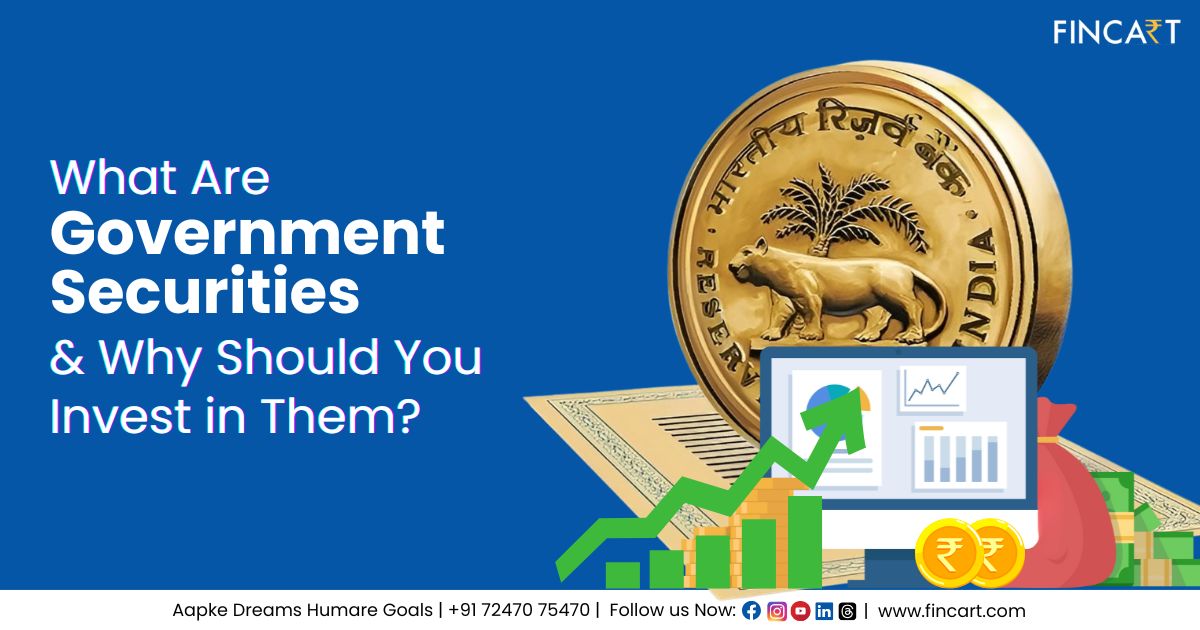When it comes to building a stable and secure investment portfolio, government securities stand out as one of the most trusted and time-tested options. Backed by the sovereign guarantee of the Indian government, these instruments offer investors a unique combination of safety, fixed income, and long-term growth potential.
If you’re looking to add safety, predictability, and long-term value to your portfolio, government securities may be the ideal solution. These low-risk instruments, backed by the Government of India, offer fixed returns and play a crucial role in balancing your investment mix.
In this blog, we’ll walk you through what government securities are, decode their role in the government securities market, explain the types of government securities in India, highlight current government securities interest rates, and guide you on how to invest in government securities—so you can make confident, informed choices about your financial future.
What Are Government Securities?
Government securities, often abbreviated as G-Secs, are debt instruments issued by the central or state governments to borrow money from the public. When you invest in a government security, you are essentially lending money to the government in exchange for a fixed rate of return over a specified tenure.
Put simply, government securities’ meaning lies in their function—they are promises made by the government to repay the borrowed amount along with interest at maturity. Because they are backed by the government, they are considered among the safest investment options available.
Securities Meaning in Finance: A Quick Refresher
“Securities” refer to financial instruments that hold some type of monetary value and can be traded. These include equity shares, bonds, debentures, and of course, government securities.
While equities are linked with ownership in a company, government securities are debt instruments—meaning you become a lender, not an owner. This makes them a lower-risk alternative, ideal for conservative investors or for adding balance to a diversified portfolio.
Types of Government Securities in India
The government securities market in India offers a variety of instruments catering to different investor needs. Let’s take a closer look at the most common types of government securities:
1. Treasury Bills (T-Bills)
Treasury Bills, or T-Bills, are short-term government securities with maturities of 91 days, 182 days, or 364 days. They are issued at a discount to their face value and redeemed at par upon maturity, making them a zero-coupon instrument.
- Maturity Tenure: 91, 182, or 364 days
- Issued at: Discounted price
- Redeemed at: Full face value
T-Bills are an excellent choice for investors who prioritize safety and liquidity. Since they are backed by the government and have short durations, they carry minimal risk and are often used for parking surplus funds temporarily.
2. Dated Government Securities
Dated Government Securities are long-term instruments issued by the central or state government with tenures typically ranging from 5 to 40 years. These are interest-bearing securities that offer predictable, fixed returns over time—making them ideal for long-term investors.
- Tenure: 5 to 40 years
- Interest Payment: Paid semi-annually
- Return Type: Fixed, pre-announced coupon rates
These securities are well-suited for conservative investors seeking stability and regular income. Because they are tradable in the secondary market, they also offer a degree of liquidity for those who may wish to exit before maturity.
3. Cash Management Bills (CMBs)
Cash Management Bills, or CMBs, are ultra-short-term government securities designed to meet the temporary cash flow requirements of the government. They are quite similar to Treasury Bills in structure but are issued on an as-needed basis with variable maturities.
- Purpose: To manage short-term cash mismatches
- Maturity: Flexible, usually less than 91 days
- Issued at: Discount and redeemed at face value
CMBs are ideal for investors who want to park funds for extremely short durations while still earning safe returns. Their flexible tenure makes them a useful tool for institutions and high-net-worth individuals managing short-term liquidity.
4. State Development Loans (SDLs)
State Development Loans, or SDLs, are debt instruments issued by individual state governments to fund their development projects. While they function similarly to dated government securities, SDLs typically offer slightly higher interest rates to compensate for the marginally higher risk.
- Issuer: State governments
- Yield: Slightly higher than central government securities
- Tenure & Structure: Similar to dated G-Secs
- Risk Level: Considered safe, with marginally higher risk than central G-Secs
SDLs are a good option for investors looking for better yields without compromising too much on safety, especially those aiming for long-term income from government-backed securities.
5. Inflation-Indexed Bonds (IIBs)
Inflation-Indexed Bonds, or IIBs, are government securities designed to protect investors from the impact of rising inflation. Unlike conventional bonds, both the principal and interest payments in IIBs are adjusted based on inflation, ensuring your real returns remain intact over time.
- Returns: Linked to the Consumer Price Index (CPI)
- Protection: Safeguards against inflation and loss of purchasing power
- Payout: Adjusted interest to maintain real income
IIBs are particularly useful during periods of high inflation, making them a smart choice for risk-averse investors who want to preserve the real value of their money over the long term.
Why Should You Invest in Government Securities?
Now that you understand what are government securities, let’s explore why investment in government securities could be a smart move, especially in the current economic scenario.
1. Low Risk, High Safety
Since govt securities are backed by the sovereign guarantee of the Government of India, the risk of default is extremely low. This makes them one of the safest investment options, particularly appealing to risk-averse investors.
2. Predictable Returns
Unlike equity markets that can be volatile, government securities offer fixed returns. You know your interest payouts and maturity amount in advance, which helps in better financial planning.
3. Portfolio Diversification
Adding G-Secs to your investment mix brings balance to your portfolio. They typically perform well when equity markets are under stress, making them an excellent hedging tool.
4. Regular Income Through Interest
Most government securities provide semi-annual interest payments. If you’re a retiree or someone seeking passive income, this can be a reliable source of cash flow.
5. Liquidity and Market Accessibility
With platforms like RBI Retail Direct and NSE goBID, it’s now easier than ever for individual investors to enter the government securities market. You can buy and sell G-Secs just like shares, providing flexibility and liquidity.
Government Securities Interest Rate: What to Expect
The interest rate on government securities is not fixed universally—it varies based on several factors such as the type of security, its tenure, and the prevailing economic environment. Investors should also be aware that these rates are influenced by broader factors like RBI’s monetary policy, inflation levels, and market demand.
Here’s a breakdown of what you can typically expect:
- Treasury Bills (T-Bills): These do not carry interest in the traditional sense. Instead, they are issued at a discount and redeemed at face value, with the difference representing the investor’s return.
- Dated Government Securities (G-Secs): These usually offer interest rates between 6.5% and 7.5%, paid semi-annually, providing a steady income stream.
- State Development Loans (SDLs): Similar to G-Secs but often offer slightly higher yields to account for the marginally higher risk associated with state governments.
Ultimately, the actual interest you earn will depend on market dynamics and when you choose to invest. Keeping an eye on inflation and policy rate changes can help you time your investment in government securities more effectively.
How to Invest in Government Securities?
Until a few years ago, investment in government securities was primarily done by large institutions. But today, individual investors can easily access this asset class through several platforms.
1. RBI Retail Direct Scheme
The RBI Retail Direct Scheme is a groundbreaking initiative by the Reserve Bank of India that allows individual investors to participate directly in the government securities market. It simplifies access by eliminating the need for intermediaries and provides a secure, transparent platform for investment.
- Account Type: Retail Direct Gilt (RDG) account
- Access: Direct purchase of government securities from RBI
- Charges: Zero brokerage, no intermediaries involved
This scheme is ideal for retail investors who want to invest in G-Secs, T-Bills, or State Development Loans without the complexities of traditional market entry. It’s a cost-effective and user-friendly way to build a low-risk, government-backed investment portfolio.
2. NSE goBID Platform
The NSE goBID platform is an easy-to-use digital initiative by the National Stock Exchange (NSE) aimed at bringing government securities closer to retail investors. It allows individuals to invest in Treasury Bills and dated G-Secs through a seamless online process.
- Eligibility: Retail investors with a valid demat account
- Transaction Mode: Net banking via supported banks
- Securities Available: T-Bills and dated G-Secs
With minimal documentation and a user-friendly interface, NSE goBID is ideal for those who prefer the comfort of familiar investment platforms and want to diversify into govt securities through their existing demat setup.
3. Through Mutual Funds
If you’re looking to invest in government securities without directly purchasing them, debt mutual funds—especially gilt funds—offer an accessible route. These funds pool investor money to invest in a diversified portfolio of G-Secs, providing exposure to sovereign debt along with professional fund management.
- Fund Types: Gilt funds, dynamic bond funds, and other debt-oriented schemes
- Benefit: Indirect exposure to G-Secs with expert management
- Liquidity: Easy entry and exit through mutual fund platforms
This option is particularly suited for investors who want the safety of government securities but prefer the flexibility, liquidity, and convenience of mutual fund structures.
4. Brokers and Banks
Many SEBI-registered brokers and commercial banks provide access to the government securities market, acting as intermediaries for retail investors. This route is ideal for those who prefer hands-on support or already have a trading relationship with a broker or bank.
- Access Point: Through trading accounts or bank investment platforms
- Support: Personalized assistance and advisory services
- Convenience: Integrated with other financial services
If you’re new to investment in government securities or feel more confident investing through familiar financial institutions, this method ensures a guided, hassle-free experience—especially useful for high-value transactions or long-term portfolio planning.
Key Considerations Before You Invest
While government securities in India are extremely safe, there are a few factors to keep in mind:
- Interest Rate Risk: If interest rates rise, the value of your existing bond may decline in the secondary market.
- Long Maturity: Some G-Secs have long lock-in periods, so liquidity may be affected unless you’re trading in the secondary market.
- Returns vs Inflation: Although safe, G-Secs may not always beat inflation over the long term. Consider inflation-indexed bonds for better real returns.
Are Government Securities Right for You?
Government securities can be a smart addition to your portfolio—but are they the right fit for your financial goals? If your investment priorities align with the following, they’re definitely worth considering:
- Capital preservation with minimal risk
- Stable, predictable income through regular interest payouts
- Diversification to balance the volatility of equity markets
If these resonate with you, then investment in government securities could offer the peace of mind and reliability you’re seeking.
At Fincart, our experienced wealth advisors work closely with you to assess your financial goals, risk tolerance, and investment horizon—helping you build a well-rounded strategy that may include G-Secs as a core component of long-term wealth creation.
Final Thoughts
Government securities may not be flashy, but they play a vital role in any well-balanced investment strategy. From Treasury Bills to long-term dated securities, these instruments offer a rare blend of safety, steady income, and stability—especially valuable in uncertain times.
Whether you’re starting out or seeking low-risk diversification, investment in government securities is a smart move. With easier access through RBI Retail Direct, NSE goBID, mutual funds, and banks, knowing how to invest in government securities has never been simpler.At Fincart, we tailor investment strategies to your needs. Our experts help you navigate the government securities market so your money grows securely, in line with your goals.




